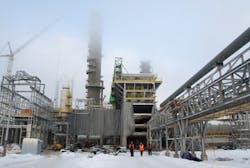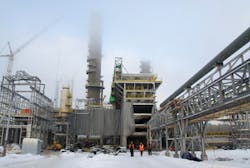Both companies are launching projects for the construction of new production complexes, but while Sibur is looking to increase its polypropylene (PP) production capacity, Nizhnekamsk is predicted to put its efforts in polyethylene (PE) production. Despite their ambitions, so far the two companies have not entered a direct clash for the Russian market and have been focusing on different sub-sectors.
RELATED: Global chemicals industry set for huge overhaul
Sibur has secured cheap supply of raw material, following the recent opening of a gas processing plant located in the Yamal-Nenets Autonomous District. The facility has a production capacity of 2.7 billion cubic meters per year. The company has opted for PP production because there is a shortage of the material on the local market and a large proportion of PP available in Russia is imported. Additionally, the production of PP is cheaper than other polymers, which need more sophisticated processing technology.
According to Sibur's managing director and head of its base polymers department, Sergei Komyshan, some of the company's major clients are PP processors. Sibur will invest about $2 billion in the new PP complex, which will provide around 500,000 tons per year, making it the biggest PP plant in Europe.
Sibur hopes that the new plant will lead to a boost in domestic demand for PP. Data from Russia's analyst company Prognoz shows that PP is the fastest growing plastics segment, with consumption doubling between 2000 and 2005.
In turn, Nizhnekamsk's parent company, the TAIF Group of Companies, consisting of the TAIF-NK refinery and two large petrochemical plants, Nizhnekamskneftekhim and Kazanorgsintez, has been building its own raw materials base. Similarly to PP, much of Russia's demand for PE is also met by import. In an attempt to increase domestic production of PE plastics the company will soon start construction work on a new complex, expected to go on stream in 2016 and reach its full operating capacity a year later.
The complex, announced as the largest petrochemical plant in Russia, will cost TAIF some $3 billion. The plant will start production using technology from British company Ineos and will also include a new ethylene complex, with a capacity of one million tons per year. Vladimir Busygin, the company's CEO, said that the production of PE will take place on three lines, making the company competitive not only on the domestic market, but also abroad.

